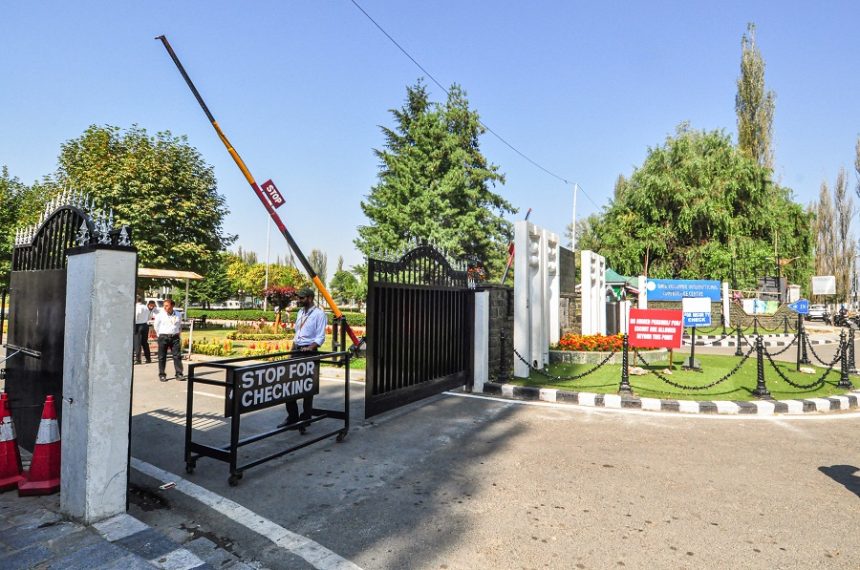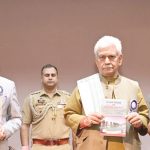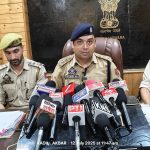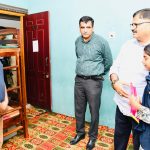• 3-tier security measures placed at 20 counting centres for smooth counting process: CEO J&K
• Amid high security, results for 90 seats to be announced today
• 1040 EVM tables, 250 postal ballot tables set for counting process
• Police issues road advisory in Bla
• Big faces in fray
Srinagar, Oct 07: The Assembly election results for 90 constituencies across 20 districts in Jammu and Kashmir will be announced today, marking a pivotal moment in the region’s political landscape. In preparation for the counting process, stringent security measures have been implemented to ensure a smooth operation, officials reported.
A comprehensive three-tier security system has been established to protect the Electronic Voting Machines (EVMs) and Voter Verifiable Paper Audit Trails (VVPATs), which are securely stored in strong rooms. These measures are designed to uphold the integrity of the election process and reassure the public of a fair counting procedure.
Chief Election Officer (CEO) Jammu and Kashmir, Pandurang K. Pole, confirmed that the counting will commence at 8 am today. “We have a three-layer security system as per the Election Commission’s guidelines. The outer layer is managed by local police, while the innermost layer is secured by the Central Armed Paramilitary Forces (CAPF),” he said.
In a transparent process, an observer will randomly select five polling stations from each constituency to compare VVPAT counts with EVM counts, ensuring integrity and accuracy in the results.
“Individuals with proper authorisation and gate passes would be allowed into counting centres, with separate entry and exit routes established for counting staff, candidates, and counting agents,” CEO Pole stated.
Mobile phones will not be permitted inside counting halls, and only individuals with election commission-approved identity cards will gain entry. In total, 28 counting centers have been established across Jammu and Kashmir, with 1,040 EVM tables and 250 postal ballot tables ready for the counting process.
“The results will also be available on the Election Commission of India’s website http://results.eci.in/ and Voter Helpline App.,” the CEO said.
Pole further said that Media centres have been set up at the counting centres for the press to access the latest updates, adding that only authorized personnel would be allowed entry into the counting centres. He also said that instructions have been given to closely monitor social media to prevent the spread of any rumours related to the counting.
Security arrangements have been heightened across the region, with comprehensive protocols in place at all counting venues. “We have left no stone unturned to ensure that the process runs smoothly and peacefully,” an election official remarked. For the Srinagar district, counting will take place at the SKICC, where tight surveillance and seating arrangements have been implemented to ensure transparency and timely result announcements.
The CEO outlined that on the counting day, strong rooms will be opened in presence of candidates, their authorized representatives, Returning Officers (ROs)/Assistant Returning Officers (AROs), and ECI observers and the entire process will be videographed. He added that mobile phones will not be allowed inside the counting centres.
Pole further said that two counting centres each have been set up for the Kupwara, Samba, Jammu, Udhampur and Reasi Districts, three counting centres have been set up for migrants while one counting centre each has been established for the remaining districts, where the counting will take place. He added that to monitor the counting process, various counting observers have also been appointed by Election Commission of India.
Senior Superintendent of Police (SSP) Baramulla, Mohammad Zaid Malik, and Additional Deputy Commissioner Baramulla, Zahoor Ahmad Raina, chaired a briefing to finalize counting day arrangements, focusing on enhanced security protocols for counting centers and force deployment. Raina emphasized the critical role of officials in maintaining neutrality and diligence.
In connection with the counting of votes, the SSP Traffic Rural, Ravinder Pal Singh, issued a traffic advisory, advising motorists to avoid unnecessary travel toward GDC Baramulla due to expected traffic disruptions during the vote counting process.
This Assembly election is the first in Jammu and Kashmir since the revocation of its special status under Article 370 in August 2019. In the 2014 Lok Sabha elections, the BJP secured a significant victory, winning three seats in Jammu and Kashmir, while the Peoples Democratic Party (PDP) captured the remaining three.
Jammu and Kashmir witnessed a voter turnout of 63.45%, slightly lower than the 65.52% recorded in 2014, with voting conducted in three phases: the first on September 18, involving 24 seats; the second on September 25, covering 26 seats; and the final phase on October 1, which included the remaining 40 seats.
Prominent candidates in the electoral race include National Conference leader Omar Abdullah, contesting from Budgam and Ganderbal assembly segments; Sajad Gani Lone of the People’s Conference (Handwara and Kupwara seats); Pradesh Congress Committee president Tariq Hamid Karra (Batamaloo); and BJP state president Ravindra Raina (Nowshera seat). Other notable contenders are AICC general secretary Ghulam Ahmad Mir (Dooru), PDP leaders Waheed Para (Pulwama), Iltija Mufti (Bijbehara), Apni Party president Altaf Bukhari (Chanapora), CPI(M) veteran Mohammad Yousuf Tarigami (Kulgam), and former deputy chief ministers Muzaffar Hussain Baig and Tara Chand.
As the counting is set for tomorrow, the political fate of 880 candidates who contested in the Jammu and Kashmir Assembly elections will be decided. This election has been characterised by intense competition and significant participation, with many political analysts noting the potential impact of independent candidates, who numbered over 350 this election cycle—the highest since the 2008 assembly elections.
Political parties, including the Congress-NC alliance, have expressed cautious optimism, while independent candidates anticipate that the results will reflect voters’ desires for development, peace, and progress in Jammu and Kashmir.








